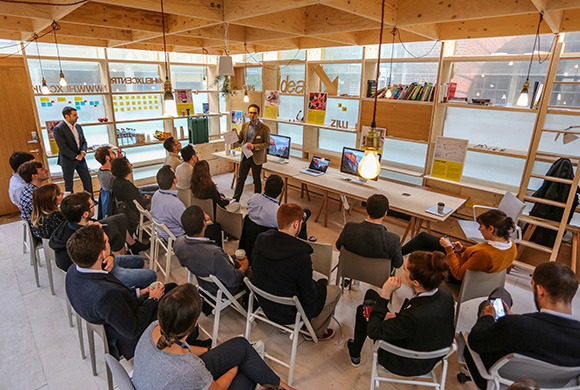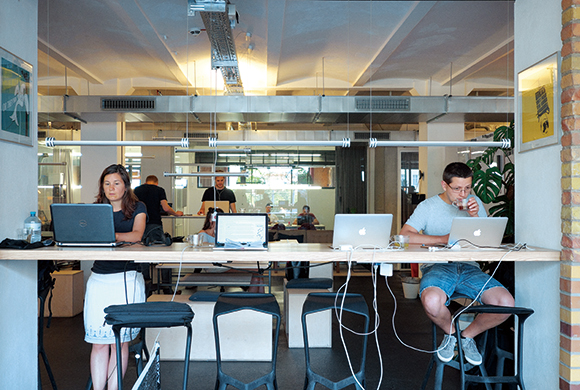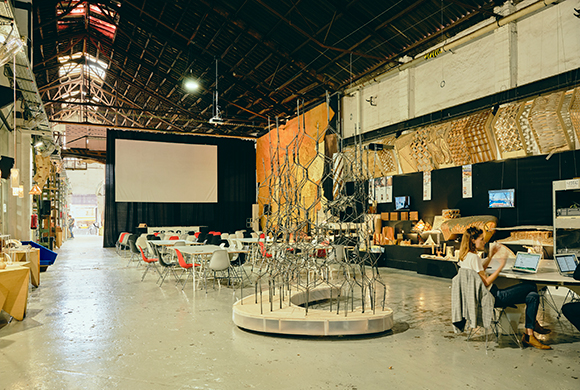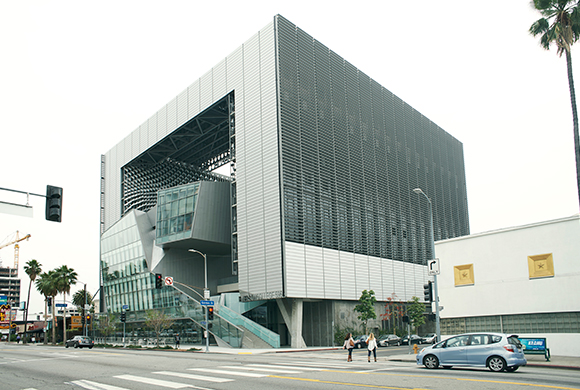Workplace
Jul. 29, 2013
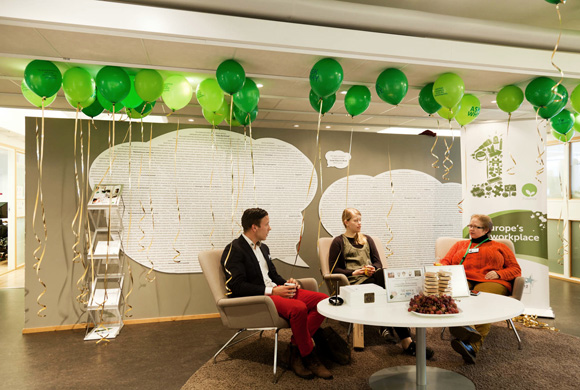
What the Best Workplace in Europe Cherishes
A software company that puts top value on kindness and compassion
[Futurice] Helsinki, Finland
From more than 1,500 companies in 18 countries across Europe, a Helsinki-based software development company, Futurice was the top entry in the 2012 Great Place to Work award’s* “Best Small and Medium-sized Workplaces in Europe” category. This is the second year in a row that the company has been listed at No 1 at the Great Place to Work for Finland.
The company was established in 2000. Today it has offices in Tampere, Finland; Berlin, Germany; and London, UK; it employs approximately 180 people.
Futurice has always had a high degree of customer satisfaction, but at the same time they always worked on the well-being of and benefit for its employees. The company created this successful system with a very strong “virtuous cycle” as a key idea: A system created by motivated people is the one that will make the customers happy. And if the end-users are happy, employees will be even more motivated. To achieve this, the stress is not on “regulations” or “control,” but it is rather on an internal platform based on “mutual trust” and “internal transparency.”
“The company was founded 13 years ago. It was set up like this because we wanted to create a place that was fun to work,” says Hanno Nevanlinna, Senior Advisor in charge of human resources. However, when the total number of employees grew to about 60, the situation changed. “I suppose it’s natural as a company moves away from the starting point, Gradually we became more of a ‘company’ and we began to think about a system of staff management” he says. “After working on it for about six months, the CEO at the time asked the founding members, ‘Why do we need to manage the employees?’”
When a company’s performance is sluggish, is it the employees who are wrong, or is it the system? The answer the founding members gave was, “The employees aren’t wrong; the problem must be in the system.”
After this, three basic changes were made within Furturice.
Firstly, they set up a task to create an environment in which all kinds of information can be shared. A basic idea is that, even if it’s practically impossible to share all information, a part of certain information can still be disclosed as long as it does not violate confidentiality. Secondly, all employees must have a solid understanding of the direction in which the company is heading. This means sharing the strategy, vision and mission – this is something every company does – but for Futurice this is thorough. Finally, the employees must make their own decisions on every issue they may have. Behind this is the idea is the trust the company has on the employees. For example, when an employee is to attend a meeting and the fee is to be paid by the company, the decision if this is beneficial to the company is to be made by the employee, not the company, The employee shouldn’t feel that they need to ask their boss, “Should I go?”
Creating this kind of internal platform required an active process to increase employees’ motivation and initiative. “This certainly isn’t normal in Finland,” Mr. Nevanlinna says. “But when we looked back at what we had accomplished, we saw that people were able to adapt to this model better than we expected. In order to make this change, what we needed was for our employees to feel that they are fully trusted and that they know they can make their own decision and put it into practice. And we keep everything as transparent and open as possible.”
 Founded: 2000
Sales: €9.5 million (2010)
Founded: 2000
Sales: €9.5 million (2010)
Employees: approx. 180
Futurice provides consulting and software development for IT, as well as associated enterprise resource planning (ERP) and training activities. The company’s varied clientele includes restaurant chains, supermarkets, mobile phone companies, real estate companies, movie studios, with a wide range of projects to suit the clients’ needs, including the improvement of distribution systems, website production, and the development of fan-targeted applications. Headquartered in Helsinki, the climate here is rather mild despite the far-north location, with an average temperature from January through February at about -4°C.
Best Workplace Award
The US-based organization Great Place to Work® examines, analyzes and shares information on workplace job satisfaction, and presents awards to great workplaces on both national and regional bases. Great Place to Work covers more than 5,500 firms in more than 40 countries worldwide including large companies, small- and medium-sized companies and nonprofit organizations; Japan was added in 2005.
 Hanno Nevanlinna
Hanno Nevanlinna
Head of HR, Senior Service Designer
“Development teams are a collection of different occupations. To make customers happy, it’s important to have friendly teams.”
 In order to gain the voluntary commitment for office improvement, comments are constantly gathered from employees about the different areas.
In order to gain the voluntary commitment for office improvement, comments are constantly gathered from employees about the different areas.
In addition to trust and transparency, another important values for Futurice are compassion and constant improvement. This is, naturally, not only for the employees, but also for the customers.
Futurice’s business is not in the making of ready-made products, but in flexibly and swift response to customer needs through the development of “agile software.” An emphasis in the process is to keep a close relationship with the customer. “For us, it’s not about us taking on a project for ourselves,” Mr. Nevanlinna says. “What I mean is that we are looking for a solution for the customer. It’s about involving the end-users and the customer, in the project, or even inviting them to a get-together. The relationship that we want is not about ‘our company’ and ‘your company’ but it’s all about ‘us.’”
The best outcome of this process is created when the customer does not really know what they want. By digging deeply into this, important needs can be discovered and a solution that in the end they will feel happy about can be constructed. “We are very focused on the training of new employees in regards to this subject,” Mr. Nevanlinna says. “We throw a lot of questions at them, and make sure that they understand that good work doesn’t mean finishing their own projects but providing solutions to the customer.”
The company carries out fieldwork as a part of the research. For example, for a request from the Finnish postal ministry about the digitalization of morning newspaper delivery, a designer accompanied the delivery people on their shift in early hours of morning. What was the most important for the project is not the vision of the ministry, but the actual condition of the work . The resulting system has actually been used all across Finland.
In many cases of development, it’s a game with time. Being able to formulate a thought is important, but still, “an idea is only an idea.” What is more important is the fact that the software is understood as it is used. “Our motto in our business activities is to get things that will be used as soon as possible,” Mr. Nevanlinna says. “We work to give shape to ideas at as early a stage as possible, and provide it for an actual test. This lets us get past mistakes early on.”
At the end of all projects, Futurice always takes time for reflection. They look at how it was developed, what was learned from the process, and how this can lead to better results. They aim for constant improvement, while working to provide compassion and care to the customer.In addition to trust and transparency, other important values for Futurice are compassion, care and constant improvement. This is, naturally, not only for the employees, but also for the customers.
 A private office. The company occupies two floors of the building, including a kitchen where employees can cook.
A private office. The company occupies two floors of the building, including a kitchen where employees can cook.
 The large meeting room, used for workshops and office meetings.
The large meeting room, used for workshops and office meetings.
 The office has a sauna. As there is only one, there are men’s days and women’s days during the week.
The office has a sauna. As there is only one, there are men’s days and women’s days during the week.

Cafeteria. The balloons along the ceiling carry the company philosophies, such as, “Transparency brings sh**loads of good.”
 360°View
360°ViewCafeteria. The balloons along the ceiling carry the company philosophies, such as, “Transparency brings sh**loads of good.”
*Touch Picture for 360° View
Software development can often be very hard and brutal business, but Futurice does always remember compassion for its employees. On a wall in the HR department is a bulletin board listing all employees’ names; along the horizontal axis are weeks of the month, with a sad or smiley face drawn into each cell.“Everyone comes here once a week to write in their mark,” says Mr. Nevanlinna. “If somebody writes in a sad face, then other people will ask, ‘What’s up?’ Whether they have too much work or private problems… it’s an opportunity to talk about issues we have.”
In addition to this are the individual’s work goals for the next six months. There is also a place to write the monthly goals to reach the target. Twice a year, employees have an interview with their managers to set goals. Once a month, teams for a particular development project gather to go over what is being done and what should be done for the goal, and discuss the setting and whether the goals are actually achievable. There is a mentor system for all employees, coaches for each project team, and various other support.
Sticky notes and a range of tools are used as means to make work more fun, and they are part of the Futurice culture. Planning Poker is an estimate of the time that will be needed to achieve the desired value; a “time bomb”—“Put together your idea within one minute!”—is used at meetings; and chocolate medals are placed around the neck of employees who work especially hard. Willingness to build great workplaces are seen everywhere. “We want to have happy employees, do happy work, and make our customers happy,” says Mr. Nevanlinna. “Our way of thinking, I think, resulted in our winning the award as the Best Workplace in Europe.”
Web-exclusive content
(January 31, 2013 coverage of Futurice of Finland)
 Chocolate medals, awarded to hard-working employees. If there is a sense of fun, work is more pleasurable and rewarding—and it shows that you can be creative without spending money.
Chocolate medals, awarded to hard-working employees. If there is a sense of fun, work is more pleasurable and rewarding—and it shows that you can be creative without spending money.
 A device called the taxi. Just one phone call can result in fun performances.
A device called the taxi. Just one phone call can result in fun performances.






